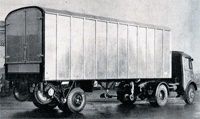
As the debate about how to optimise the UK’s transport infrastructure rages on, here’s an intriguing idea from The Engineer’s archives that may be worth revisiting: the road-rail freight vehicle.
Developed to reduce expensive handling costs and time penalties incurred when ‘interchanging freight between road and rail vehicles’, the UK-designed ‘road-railer’ prototype was, wrote The Engineer, ‘equipped with a road and rail-wheel assembly by which the appropriate set of wheels can be lowered into an operative position to adapt the vehicle for road or rail travel’.
Based loosely on a vehicle designed by the Chesapeake and Ohio Railway in the US, the UK prototype, developed by ‘the engineers of British Railways and the Pressed Steel Company of Oxford’, featured an interesting design: ‘The axle of the vehicle was carried on a beam structure pivoted at the centre.
‘Hydraulic jacks are used to pivot this beam structure to lower the road wheels and raise the rail wheels and vice versa in accordance with the class of duty. A special coupling is fitted at the leading end of the vehicle chassis by which it is coupled to the trailing end of a similar trailer when making up a train.’
Register now to continue reading
Thanks for visiting The Engineer. You’ve now reached your monthly limit of premium content. Register for free to unlock unlimited access to all of our premium content, as well as the latest technology news, industry opinion and special reports.
Benefits of registering
-
In-depth insights and coverage of key emerging trends
-
Unrestricted access to special reports throughout the year
-
Daily technology news delivered straight to your inbox










Water Sector Talent Exodus Could Cripple The Sector
Well let´s do a little experiment. My last (10.4.25) half-yearly water/waste water bill from Severn Trent was £98.29. How much does not-for-profit Dŵr...